Quantitative Research

Reflecting on the impact and benefits of the Quantitative Research can yield important insights into educator’s learning and professional journey.
Enhanced Data Literacy
One of the primary benefits is the development of robust data literacy. Educators learn to interpret and analyze quantitative data effectively, enabling them to make informed decisions based on evidence. This skill is crucial for evaluating educational practices and outcomes, enhancing their ability to engage with research critically.
Evidence-Based Practice
Quantitative research empowers educators to adopt evidence-based practices. By understanding quantitative methods, they can assess the effectiveness of various teaching strategies and interventions. This approach fosters a culture of accountability, where decisions are grounded in reliable data rather than intuition alone.
Research Competence
Educators gain essential research skills that prepare them to conduct their studies. Familiarity with quantitative methodologies allows them to design rigorous research projects, collect data systematically, and analyze results. This competence not only enhances their credibility as researchers but also contributes to the broader field of education.
Advocacy for Educational Improvement
With a solid foundation in quantitative research, educators are better equipped to advocate for necessary changes in their institutions. They can present data-driven arguments to stakeholders, helping to influence policy and practice based on empirical evidence. This advocacy is crucial for addressing systemic issues in education.
Critical Reflection
The course encourages critical reflection on one’s own biases and assumptions. By examining how personal perspectives can impact data interpretation, educators are prompted to approach their research with greater objectivity. This awareness fosters a more nuanced understanding of educational challenges and the complexities of data.
Collaboration and Networking
Engaging with quantitative research often leads to collaboration among peers. Educators may form networks to share insights, resources, and methodologies, enriching their professional development and fostering a community of practice centered around data-informed decision-making.
Overall Impact
In summary, quantitative research significantly benefits educators by enhancing their data literacy, promoting evidence-based practices, and equipping them with essential research skills. It fosters critical reflection and advocacy, ultimately empowering them to drive meaningful change in the educational landscape.




